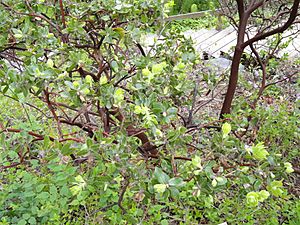Whitehair manzanita facts for kids
Quick facts for kids Whitehair manzanita |
|
|---|---|
 |
|
| Scientific classification | |
| Kingdom: | |
| (unranked): | |
| (unranked): | |
| (unranked): | |
| Order: | |
| Family: | |
| Genus: | |
| Species: |
A. viridissima
|
| Binomial name | |
| Arctostaphylos viridissima (Eastw.) McMinn
|
|
The Arctostaphylos viridissima is a special type of plant called a manzanita. People also call it the whitehair manzanita or McMinn's manzanita. This plant is found only in one place: Santa Cruz Island. This island is part of the Channel Islands off the coast of California. When a plant or animal is found only in one specific area, we say it is endemic to that place.
Contents
Discovering the Whitehair Manzanita
The Arctostaphylos viridissima was first described in 1933. This means scientists officially named and recorded it that year. It was named by Alice Eastwood and later by McMinn.
What Does This Plant Look Like?
The whitehair manzanita is a type of shrub. A shrub is a woody plant that is smaller than a tree. This manzanita can look very different from one plant to another.
Size and Shape
Some whitehair manzanitas are small, like a matted bush. They might only be about 1 meter (3 feet) tall. Others can grow much larger. They can spread out like a small tree, reaching over 4 meters (12 feet) in height.
Bark and Twigs
The main stem and branches of this plant have bark that peels off. This peeling bark is usually red. The smaller twigs are covered in soft, woolly hairs. They also have long, stiff white bristles.
Leaves
The leaves of the Arctostaphylos viridissima are oval-shaped. When they first grow, they feel fuzzy. As they get older, they become smooth, green, and shiny. Each leaf can grow up to 3.5 centimeters long.
Flowers and Fruit
The flowers of the whitehair manzanita grow in tight groups. These groups are called an inflorescence. The flowers are shaped like small urns, which is common for manzanita plants. After the flowers, the plant produces fruit. The fruit is a fuzzy drupe. A drupe is a type of fruit with a hard pit inside, like a peach or a cherry. These fruits are a little over one centimeter wide.

